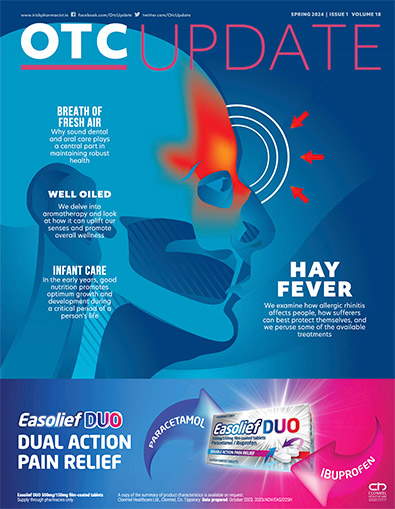Terry Maguire examines where pharmacists fit into the climate change narrative
As COP26 brought traffic chaos and 100 per cent hotel bed-occupancy to Glasgow last November, we were all being asked to think what it is we, as individuals, are doing for the future health of our planet.
Good question, because for me at least, and I suspect the majority of busy pharmacists, climate change is a topic we think is far from our sphere of influence. Where I don’t claim to fully understand the science, I certainly don’t argue against it. The impact of rising global temperatures is already causing climate havoc in certain parts of the world but, to be fair, it has not disrupted any of my privileged, entitled and charmed little life to date and if anything, I may be more likely to dine al fresco during the coming summers in my much-loved Donegal.
But the evidence is stark. Globally, the weather is becoming more extreme and severe events more common. Typhoons and floods in the Far East, Russia and Australia in recent months, and extreme heat in parts of the US, identify a tripling of extreme weather events since the 1980s.
Climate change resulting in extreme weather has a major and direct effect on health. But there are also less-direct impacts, such as an increase in stress-related mental health disorders and malnutrition as a result of crop failure. Vector- and water-borne diseases will also be more prevalent in flooded regions. Poor countries fair worse, leading to an increase in the inequalities. Higher temperatures cause problems for the cardiovascular and respiratory systems. The ‘heat island effect’ that occurs in cities leads to an increase in ozone smog, with consequent exacerbation of asthma and COPD. Build-up of nitric oxide and sulphur dioxide worsen cardiac conditions. Try visiting Delhi at this time of year, where the smog is like the pea-soupers of 1940s London. The direct and indirect death tolls are not insignificant. One of the main immediate risks of heat is dehydration. Heat stress can be exacerbated by diuretics and anti-hypertensives, so there will be a need to adjust dosages of these drugs in heatwaves, which would really suggest that if pharmacists were involved, we will really have reached our clinical future. The UK’s chief scientist Sir Patrick Vallance has made it clear that compared to Covid-19, and he is the champion of Covid-19, climate change is by far a bigger health problem.
The Department of Health for England has produced a heat-wave plan. Chief Pharmacist Keith Ridge is taking a lead and has written:
“My vision of a clinical profession includes pharmacy taking responsibility for the local community helping to improve health and reduce health inequalities. Arguably the biggest threat to our society is from climate change and we must minimise our carbon emissions in our everyday lives.”
Climate change is the new zeitgeist, and I suspect many more pharmacist leaders will jump onto this fast-moving bandwagon as we all come to view our lives, and our professional lives, more meaningfully through the lens of climate change. It will become a moral imperative to act and behave in the interests of the planet, yet in doing so, we risk paying lip-service to what is a critically important health issue, or as Greta Thunberg says, we might be accused of talking “blah, blah, blah” as we ‘greenwash’ our profession.
So before we get too evangelical, stop using deodorant or change our underwear less than we need to, we should to be realistic about what it is we can do to make a meaningful and sustainable impact. So who is doing what?
The co-operative pharmacy group, which runs a network of pharmacies across England, have really taken the lead and have published an ethical strategy that includes a section on climate change. As part of this, it has reduced its carbon footprint by bringing in a once-daily delivery policy to its branches, and having an extensive recycling policy and a commitment to renewable energy sources. All branches source their electricity from renewable sources.
The wholesaler delivery policy is interesting, and it might be sensible to ask, does any pharmacy really need two deliveries a day from the wholesaler? Would once-daily deliveries put patients at such risk that it would be unprofessional? It really is a matter of stock levels.
I’m not sure if co-op delivers to patients’ homes. This is common in the UK as a means of competition between pharmacies, but getting people to walk to their doctor to collect prescriptions and then to the pharmacy to collect their medicines would significantly improve their individual health, while potentially reducing global warming. I know few pharmacists will listen to this, but a staggering 5 per cent of all transport emissions in the UK are from healthcare-related journeys. We really need to address these ‘care miles’.
Big Pharma has been more active for longer on this issue, possibly because Big Pharma is more likely to get public criticism if they fail to act, and their manufacturing processes can produce all sorts of pollution. GlaxoSmithKline has teamed up with Accenture Sustainability Services and produced a guide to how the industry can and should respond to climate change. Recycling inhalers is one example of a commitment to sustainability that goes back 10 years. Pfizer also has a policy framework that promotes implementation of low carbon and renewable energy projects. But you do wonder if these policies are just vanity projects to say, if anyone should ask, that the industry is doing a lot and have been doing it for a very long time. The new term for this is ‘greenwashing’.
Within the UK’s mighty NHS, sustainability is high on the agenda, if not at least because of the potential cost savings. Unsurprisingly, the largest contributor to the NHS carbon footprint is pharmaceuticals, their manufacture and their use. There is now a commitment to consider the environmental impact of a medicinal product, which could be interesting, when more expensive medicines manufactured locally might be deemed superior to cheaper versions that have travelled all the way from China to sit on the dispensary shelves.
Medicine wastage is also a huge issue and with more than 10 per cent of all medicine unused, we need to look at schemes to re-use medicines or perhaps be more efficient in initial supply.
We could reduce our workplace energy use. Non-essential lighting should be turned off, eco-boil the pharmacy kettle with just enough water for our teas and coffees, which might seem petty, but many petty things do add-up.
I reduced my pharmacy energy costs by more than 50 per cent when I installed LED lighting across the store. A pharmacy refit in 2010 had installed lighting that was so bright, it was visible from space, with lamps so hot we seldom needed heating in the pharmacy. So here was something that was a real win-win, reducing direct costs while reducing energy.
And I have yet to mention pharmaceutical packaging, which could be viewed as excessive in the extreme. And it’s not only the packing from medicines, but the plastic and cardboard outer packaging of all the goods we retail. I know, I know, I’ve morphed into ‘Swampy’ the eco-warrior and we’re only small businesses, so we only can have a small impact. But the time has come, as Prof Angela Alexander said at this year’s Pharmacy Show in Birmingham, that pharmacists need to change. In what was the first pharmacy talk I’ve heard on pharmacy’s role in climate change, I realised one thing for sure — it won’t be the last.







